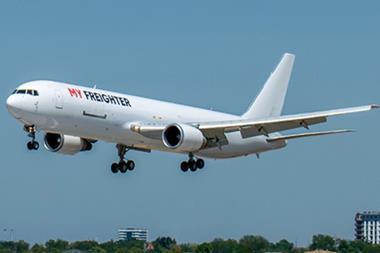Cathay Pacific has appointed Ronald Lam to the newly created role of director commercial and cargo.
The role was created earlier this year as part of a shake-up of the management organisation.
Previously, the cargo department had its own director role, mostly recently occupied by Simon Large, who is now director of customer at the airline group.
Meanwhile, Mark Sutch, who held the role of cargo commercial, has moved over to become be regional general manager, South Asia, Middle East & Africa.
In his new role, Lam is responsible for passenger revenue management, sales and distribution and network planning, as well as commercial and planning functions of cargo.
Previously, he was a director of Cathay's aircraft maintenance subsidiary Hong Kong Aircraft Engineering Company Limited (HAECO), looking after its business in Hong Kong.
Lam joined Cathay Pacific in 1996 and has worked for the airline in a variety of managerial roles in Hong Kong, Sri Lanka and Japan.
His previous senior positions include general manager information management and general manager sales & distribution at Cathay Pacific. He has also held a cargo management role.
"I am the Director of Cargo. The role has not disappeared and Cargo will continue to have a voice at the top of the company," Lam told the Cathay cargo news website. "There are different ways of organising ourselves as an airline, with pros and cons to each. However, we have chosen to focus on the synergy between our passenger and cargo businesses.
"Currently, our freighter fleet contributes approximately half of our capacity with the other half provided by our passenger aircraft bellies.
"While both of these aircraft types remain pivotal to Cargo’s future, they require careful management so as to maximise our return on these assets. For instance, take network planning.
"Until our recent reorganisation, passenger network planning and freighter planning had two separate teams in two separate departments despite the clear synergies between them. These functions are now integrated under one department, with a single reporting channel to me.
"An additional advantage of the new structure is that there is now a single person – the Director Commercial and Cargo – accountable for all of the airline’s top line revenue: passenger, cargo and ancillaries, up to and including inflight sales revenue.
"Whereas in the past revenue accountability has sat with multiple people in the organisation, this new single point of accountability enables the organisation to execute a clear focus on revenue generation.
"The fact remains that no matter how we organise ourselves, Hong Kong will remain a leading global cargo hub. Cathay Pacific will continue to support and, more importantly, develop the air cargo industry that is vital to Hong Kong’s status as a global aviation hub.
"Cargo will remain as an important revenue generator and contributor to the overall general airline business. That is why we want a renewed focus: with one person accountable for all the revenue generation because we recognise that cargo is such an integral part of that."
He added that there were also no plans to remove Cathay Pacific Cargo as a standalone entity.
Looking to the future, he said he would like to see Cathay Pacific Cargo continue to be a reliable player in the logistics and supply chain industry, facilitating cargo movement on a very extensive network using market-leading solutions and products.
Secondly, he would like to see a "strong work culture with our customers in mind and collaborative work across different teams worldwide with a focus on being innovative and progressive".
The management shake-up will see a total of 600 “senior, middle management and non-managerial roles” at the group’s headquarters cut.
Around 190 management and 400 non-managerial roles will go, representing 25% of management and 18% of non-managerial positions respectively.
It comes as the airline continues to record losses. The airline recorded a loss of HK$2bn in the first half of the year, despite the positive performance of its cargo business.
The airline group blamed intense competition, higher fuel prices, the cost of fuel hedging, the strength of the Hong Kong dollar and higher aircraft maintenance cost for its performance.
Read more air cargo people news










